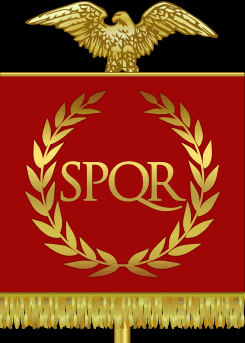The city of Rome was founded on the edge of civilization, far from the center of Greek and Persian culture. Life was simple, and rustic virtues were held in high esteem. In 509 BC, the people of Rome threw out the hated Etruscan Monarchy and founded a republic based on a senate and a popular representative body of elected tribunes. From this point the city of Rome expanded and developed independently in the center of Italy. In 1776, the people of the American colonies, also at the edge of civilization, overthrew the monarchy of Great Britain and established its Republic based on a Constitution.
Trend of Isolationism
Early Romans liked to keep to themselves and ignored the politics of the outside world. In 387, the Romans were unexpectedly attacked by the Gauls of northern Italy. This rude awakening forced the Romans to pay attention to international politics and the started a program of alliances with their immediate neighbors. In 1941, the United States was attacked by the Imperial forces of Japan and pulled into the global conflict World War II. In each case, the republics were forced out of isolationism and into a more internationally assertive posture.
Rise to Superpower Status
After the sack of 387 Rome remained, for the most part, concerned with Italy and Sicily. They were dragged into a larger conflict when Carthage attacked Rome’s Sicilian ally. Rome and Carthage eventually had to fight a series of wars that culminated in the final destruction of Carthage and the complete domination of the Western Mediterranean by Rome. In much the same way, World War II and the subsequent Cold War forced America into an even more powerful position in order to fight both its Axis and Soviet enemies.
Although three examples is a meager sampling of the many similarities of the two Republics, these cannot be ignored. Further examination of the early Roman Republic can only convince the reader that the parallel history of Rome can serve as a mirror with which to examine our own Republic. Perhaps we can indeed learn from both their mistakes and triumphs. If we ignore the similarities of the two republics we may suffer the consequences. For as it has been said, “Those who don’t know their history are doomed to repeat it.”


As late as this post is, I'd throw America's rude awakening back to sometime around the Civil War. We were nearly set upon by Napoleon III's "grand plan for the Americas" during the war, and thank the absentee gods that the Mexicans were there to take the brunt of it, create the holiday of Cinco de Mayo, and pull our asses from a fire we barely felt the heat of. And before that, our capital was burned down, which more closely represents the Cisalpine Gauls sacking Rome, especially as they were periodically aligned to the Etruscans.
ReplyDelete